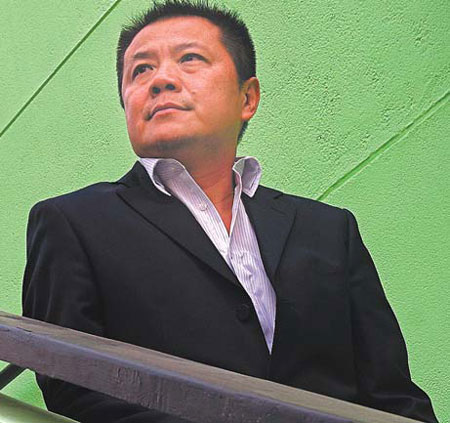Author Wang Gang enjoys joking around, preferably over a drink or two, and it's often hard to tell whether he's being serious or just saying something for its shock value.
 |
| Award-winning novelist Wang Gang's latest work is available in English. |
Talking in Chinese about his best-selling novel, English, Wang describes life during the "cultural revolution" (1966-76) as "constant war, real or imagined, and nothing to eat".
"Today, people are getting richer and everyone's getting fat," he says. "Money changes everything for the better, of course."
He professes not to see any downside to this material progress and it is only toward the end of the interview that he admits that being overweight can be unhealthy, or that capitalism has its problems too, like the economic crisis.
Wang has previously been quoted as saying writers should be more like the women who give "massages" at hair salons and should stick together.
He is certainly entertaining and so are his novels. He has published three so far in addition to working on film scripts, but it was English that won him national recognition and a major literary prize in 2005.
"It changed my life because people started paying attention to me," he says, acknowledging that the need to be noticed is one theme of the book and part of his personality.
Now that English is in English (published this month), the almost-mythical journal of discovery that Wang constructs appears to have come to a successful conclusion.
It's set in the author's native Urumqi, Xinjiang Uygur autonomous region, and the teenage protagonist, Love Liu, is deeply influenced by his overtly Westernized teacher from Shanghai who has an English dictionary.
This was a rare prize during the "cultural revolution" and Liu breaks a leg (literally) stealing it.
Although Wang neatly sidesteps the issue of which parts of the semi-autobiographical novel are fiction - "It's so long ago even I don't know now which is which" - he admits that part was true.
"I wanted the English book so much I took it," he says. "My teacher's response, when he found out, was to give it to me as a present."
It was a defining moment, not just for the character Liu, but also for Wang, as a new world of possibilities opened up for him.
"When I learned English I found out about life, things I had not known up to that point. English represented the things we wanted but couldn't get, like political culture and democracy," Wang says.
"We couldn't get them then because of the cultural reaction and even since the reform and opening-up we haven't got all of them."
Wang says he's not worried about being politically correct or getting censured for speaking his mind.
In person and in his writing, Wang seems to enjoy taking a poke at authority figures. Liu's relationship with his teacher is so all-consuming his parents' influence is diminished by comparison, a situation that also parallels Wang's life.
"My mother and father were so busy they did not have so much time for me," he says. "That's why I was so close to my teacher."
Books, too, seem to have become surrogate parents and Wang is most animated when talking about his favorite authors, like Stendhal, Guy de Maupassant and Leo Tolstoy.
Why no Chinese in the list? "When we started to read books Chinese authors weren't that good," he says. "Now we have Liu Xinwu and Mo Yan, so things have improved."
As for the English translation of English his publisher asked him to read the first chapter and that's all he managed. "I'm told it sounds like an English writer, rather than a translated novel," he says.
This appears to please him, but with such a contrarian it's hard to tell.
(China Daily March 31, 2009)